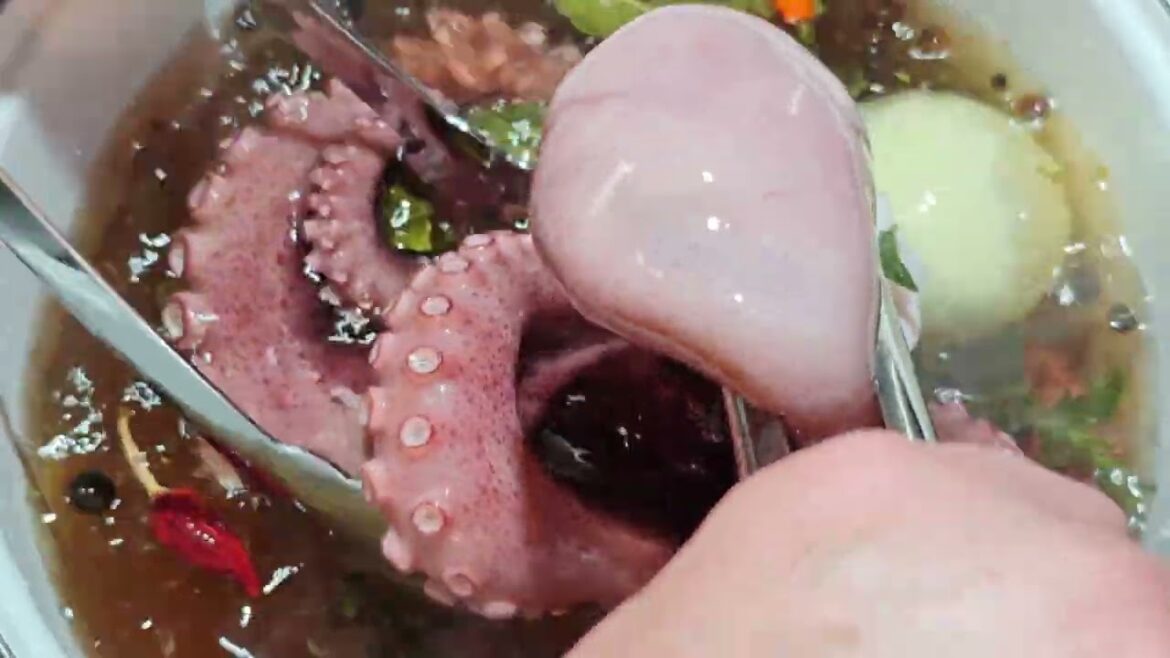Octopus.
The common octopus is a fantastic eight-legged mollusk that has three hearts and blue blood. The lack of a skeleton allows it to slip through holes up to 6 cm in diameter and take on any shape. The octopus can instantly take on its surroundings’ color, pattern, and even texture, hiding unnoticed from potential predators and unsuspecting victims. In case of danger, it escapes by escaping in a cloud of ink, which dulls the predator’s sense of smell, making it difficult to track the fleeing octopus. And in a hopeless situation, it generally loses its tentacle arm, which then grows back.
The common octopus is one of the most studied and intelligent invertebrates in the world, with short-term and long-term memory.
The octopus can grow to a size (body with tentacles) of 1.15 –1. 30 m. The largest recorded weight of this mollusk is 10 kg.
This mollusk is common in temperate and tropical seas from the coasts of the British Isles, in the Bay of Biscay, in the waters of the Mediterranean Sea, to the coasts of northwestern Africa. Its habitat extends only to salt water bodies.
This territorial loner lives on rocky, sandy, and muddy formations, overgrown with corals or algae, near the coastline with a warm water temperature of +15 -+26 ° C. Some octopuses can be found in shallow water in warm weather, but most of them are at a depth of 100 to 150 meters. In winter, it moves deeper into the bottom areas of water bodies and hides in burrows or crevices between rocks.
The breeding season occurs in spring and autumn, after which the female spends all her time caring for the eggs she has laid, denying herself food, and starving to death after they hatch.
Octopus is considered a delicacy. In Mediterranean countries, it is prepared as a main course or appetizer.
Octopus is one of the most popular seafood delicacies on all continents, along with shrimp. It can be prepared in various ways. Grilled octopus tentacles, octopus salads, carpaccio, octopus rice (a traditional Portuguese dish – Arroz de polvo), risotto, and octopus pasta are very popular. These mollusks are especially valued, caught in the central Atlantic, along the coasts of Portugal, Spain, and Morocco. They are distinguished by higher taste and less weight loss during cooking, which is important in cooking.
Spanish octopuses with the index T are usually flower-shaped octopuses that undergo pre-processing, as a result of which they have a higher percentage of yield after boiling. They are also softer. This type of octopus is especially loved by restaurants
How to cook octopus:
Cooking octopus is extremely simple. First of all, it must be defrosted. There is a common misconception that frozen octopuses are tougher than chilled ones. This is a misconception. On the contrary, octopuses are specially frozen to achieve greater softness. It is also a mistake, and most often an advertisement (lie), that the octopus is freshly caught, chilled, etc. Almost all mollusks are frozen, which does not harm them at all, but on the contrary, improves them. The exception is those octopuses that you can be offered in restaurants on the seashore from today’s catch. Before freezing, octopuses undergo special mechanical processing, the essence of which is actually to “beat off” the mollusk. So, defrost the octopus and lower it into a saucepan with boiling water, to which you can add a bay leaf and black peppercorns. Cook for 30-40 minutes over low heat. That’s it! Very often, octopus is cooked in red wine or with the addition of wine, due to which the octopus acquires an appetizing red color. In addition, wine reduces the smell characteristic of seafood. In addition to the wine itself, a wine cork is often placed in the broth. There is an opinion that this simple action also contributes to the softness of the octopus.
There is also a method of boiling when no water is added at all. The octopus gives off its liquid and is cooked in it. This option is most often needed in cases where a dish with a sauce is planned and a base is required for it. For example, pasta with octopus. During the cooking process, the mollusk loses about 50% of its weight, which is normal. After cooking, the octopus is ready for further culinary processing. It can be grilled, salad, carpaccio, or anything else to your taste.
SUBSCRIBE TO THE CHANNEL,
LIKE,
CLICK THE BELL,
COOK WITH LOVE!
youtube.com/@vitalizmmenu/videos
#cookingvideo
#foodstagram
#vitalizmmenu
#VitalizmMenu
#food
#cooking
#FoodLover
#foodie
#foodblogger
[Music] Damn. Damn. [Music] [Music] Heat. Heat. [Music] Heat. Heat. Heat. [Music] [Applause] Heat. [Music] Heat. Heat. [Music] [Music] [Music] [Music] Yeah. [Music] Wow. Heat. [Music] [Music] Heat. Heat. N. Heat. Heat. [Music] [Music] [Music] Heat. [Music] Heat. [Music] [Applause] [Music] Heat. Hey, Heat. [Music] Heat. Heat. Heat. Heat. [Music] [Music] [Music] [Applause] [Music] Heat. Heat. [Music] [Applause] [Music] [Applause] [Music] [Applause] [Music] [Music] [Music] Heat. Heat. [Music] [Music] [Music] [Music] Heat. Heat. [Music] Heat. Heat. [Music] [Applause] Heat. [Music] Heat. [Music] Heat. [Music] Heat. Heat. [Music] Heat. [Music] Heat. Heat. [Music]

